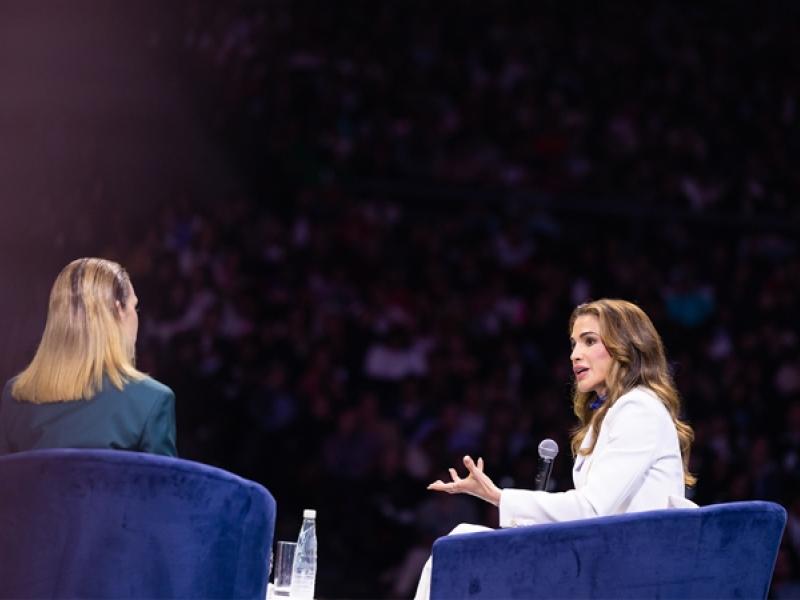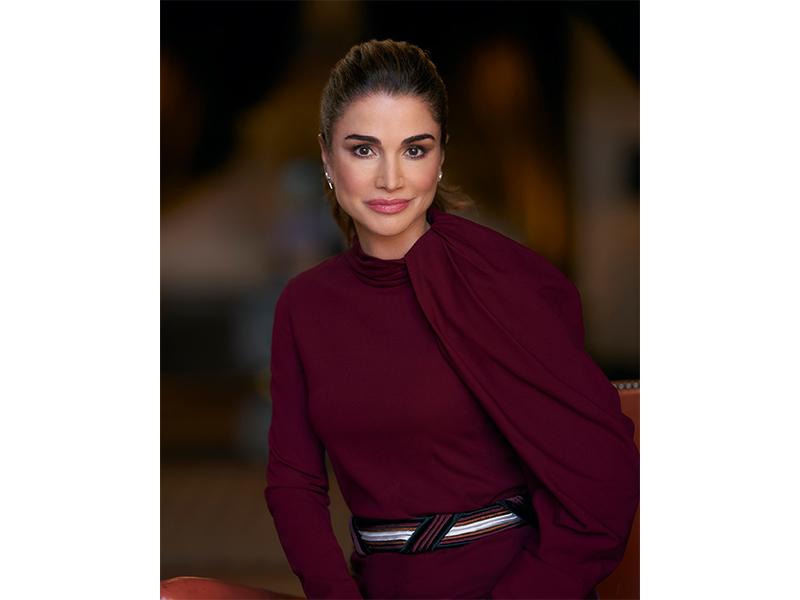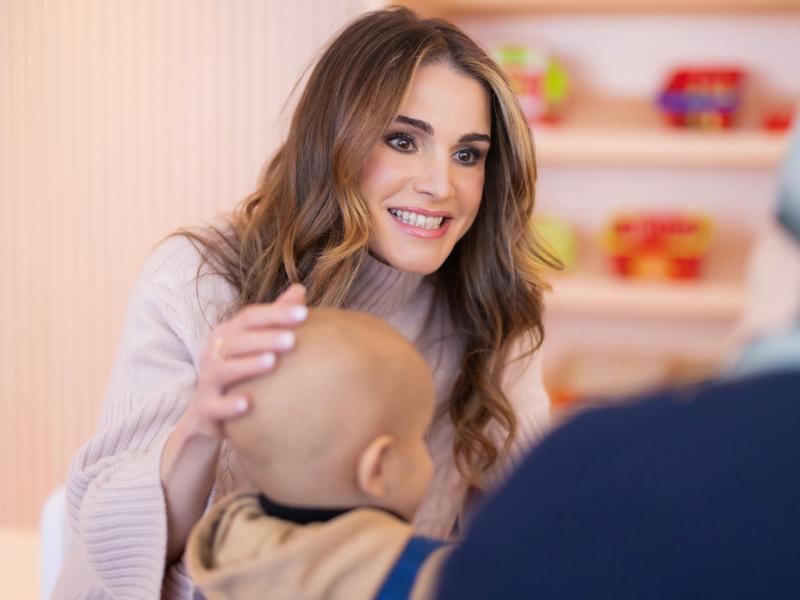CHRISTIANE AMANPOUR: Jordan is home to 40 percent of the total registered Palestinian refugees in the Middle East, according to the UN. That is simply a huge number, especially for a small country. Jordan's Queen Rania is herself of Palestinian descent. And she's joining me now for a world exclusive from Amman, the capital. Queen Rania. Welcome to our program.
QUEEN RANIA: Thank you, Christiane.
CHRISTIANE AMANPOUR: Can I ask you first, as an Arab, as a Palestinian, as a human being, a mother, how you are feeling ever since October 7?
QUEEN RANIA: Well, look Christiane, I cannot begin to describe to you the depth of the grief, the pain, and the shock that we are feeling here in Jordan. All of us are united in this grief, regardless of our origin. We just can't believe the images that we're seeing every single day coming out of Gaza. We're going to bed seeing those images and waking up to them. You know, as a mom, we've seen Palestinian mothers who have had to write the names of their children on their hands, because the chances of them being shelled to death, of their bodies turning into corpses, are so high.
I just want to remind the world that Palestinian mothers love their children just as much as any other mother in the world. And for them to have to go through this, it's just unbelievable.
And equally, I think that people all around the Middle East, including in Jordan, we are just shocked and disappointed by the world's reaction to this catastrophe that is unfolding. In the last couple of weeks, we have seen, you know, a glaring double standard in the world. When October 7 happened, the world immediately and unequivocally stood by Israel and its right to defend itself, and condemned the attacks that happened. But what we're seeing the last couple of weeks, we're seeing silence in the world. Countries have stopped at just expressing “concern,” or acknowledging the casualties, but always with a preface of declaration of support for Israel. Are we being told that it is wrong to kill a family – an entire family – at gunpoint, but it's okay to shell them to death? I mean, there is a glaring double standard here and it is just shocking to the Arab world.
This is the first time in modern history that there is such human suffering and the world is not even calling for a ceasefire. So the silence is deafening and, to many in our region, it makes the Western world complicit through their support and through the cover that they give Israel, that it is just trying to defend itself. Many in the Arab world are looking at the Western world as not just tolerating this, but as aiding and abetting it. And this is just horrendous and it's deeply, deeply disappointing to all of us.
CHRISTIANE AMANPOUR: Queen Rania, I'm going to ask you more about this and go deeper into your feelings about this. But first I want to ask you, you know, the Israelis are shocked to their core, the grief… What happened to them has never happened in that way since the Holocaust. And they are shaken to their core, as I said, and in grief. I just want to get from you what you felt on October 7.
QUEEN RANIA: Well, of course, I was shocked. Jordan has made its position very clear. We condemn the killing of any civilian, whether Palestinian or Israeli. That is Jordan's ethical, moral position. And it's also the position of Islam. Islam condemns the killing of civilians. As my husband mentioned recently, the Pact of Omar, which was issued on the gates of Jerusalem 15 centuries ago – that's 1,000 years before the Geneva Conventions – orders Muslims not to kill a woman, child, or elderly person, and not to destroy a tree or hurt a priest. So this is what we believe are the rules of engagement at time of war. But they need to apply to everybody.
So yes, there was the shock and there is the condemnation. But why isn't there equal condemnation to what is happening now? I just want to emphasize that this conflict did not begin on October 7, although it has been being portrayed as that. You know, most networks are covering the story under the title of ‘Israel at War.’ But for many Palestinians on the other side of the separation wall and other side of the barbed wire, war has never left. This is a 75-year-old story; a story of overwhelming death and displacement to the Palestinian people. It is a story of an occupation under an apartheid regime that that occupies land, that demolishes houses, confiscates lands, military incursions, night raids… The context of a nuclear-armed regional superpower that occupies, oppresses, and commits daily documented crimes against Palestinians is missing from the narrative. You know, for too long, Palestinians lives…
CHRISTIANE AMANPOUR: Queen Rania, I'm sorry to interrupt you. I want to ask you a specific question because you're using a lot of words which clearly many in the Arab World have used – words like apartheid and the rest. But you know that you are going to come under a lot of criticism from Israel and its supporters. And I'm wondering whether you're coming out to speak…
QUEEN RANIA: But let me just emphasize that “apartheid” is a designation that was given not by Arabs, but by Israeli and international human rights organizations.
CHRISTIANE AMANPOUR: You wrote in an Instagram story just in the last week, “It isn't self defense if you're an occupying force,” and you showed the destruction of Gaza. And you have posted a video of yourself from a presser in 2009 during that war, saying “It is heartbreaking to see how little has changed. The world cannot remain silent. This has to stop.” Do you feel that you have a particular voice, you know, as Queen of Jordan, in a country that has a peace treaty with Israel, to speak up?
QUEEN RANIA: It's not about me, it's about speaking up for humanity. You know, this is not about being pro-Israeli or pro-Palestinian. This is about choosing the people, the everyday people on both sides. And explaining again that the Palestinian people have for too long been living under oppression and dehumanization. They suffered daily indignities and human rights violations, whether being jailed or humiliated or harassed. They do not have freedom of movement. There are over 500 checkpoints scattered all over the West Bank. You have a separation wall, which is deemed illegal by the International Court of Justice, that has separated the territories into 200 disconnected enclaves. And you've seen the aggressive expansion of settlements on Palestinian land, and those have interrupted the territorial contiguity of the territories and has deemed an autonomous, independent Palestinian state not viable. So this is the background of this conflict. There is a hyper-fixation on Hamas now because of what happened in the last couple of weeks. But this is a problem that far precedes Hamas and will continue after Hamas. This is a fight for freedom and for justice, and that is what needs to be heard.
CHRISTIANE AMANPOUR: Can I ask you this question then? Because, quite a brave…I think she's Saudi anyway, a journalist on the Saudi television network Al Arabiya, took this and hammered Khaled Mashal, the former head of Hamas, and said to him, the butchery – well, that's my word – But she said, what everybody is seeing on their screens has turned the world away from the Palestinian cause. And just to expand, people are saying Hamas and what it did has brought this down on these poor people of Gaza. Do you accept that?
QUEEN RANIA: Well, I do not believe in, as I said, in the killing of civilians. But this is a story of violence that has been going on now for so long. And this violence needs to be condemned. But at the end of the day, what we're seeing today, and what people need to understand, is that yes, under the guise of the right to defend itself, we are witnessing atrocities.
You know, every country has a right to defend itself, but not through any means – not through war crimes, not through collective punishment. 6,000 civilians killed so far, 2,400 children – how is that self-defense? We are seeing butchery at a mass scale using precision weapons. So for the past two weeks, we have seen the indiscriminate bombardment of Gaza. Entire families wiped out, residential neighborhoods flattened to the ground, the targeting of hospitals and schools and churches and mosques and medical workers, journalists, UN aid workers – how is that self-defense? Why is it that whenever Israel commits these atrocities it comes under the banner of self-defense, but when there is violence by Palestinians, it is immediately called terrorism. Is the word “terrorist” just reserved exclusively for Muslims and Arabs
CHRISTIAN AMANPOUR: Well let me ask you then…
QUEEN RANIA: There's a real double standard here that we’re seeing. A false symmetry that we see…
CHRISTIAN AMANPOUR: Well, let me ask you this, your husband, King Abdullah…
QUEEN RANIA: Yes, false symmetry, because these are not two equal people in the conflict. One is an occupier, and one is the occupied. One has a military, the mightiest in the world, and the other doesn’t have a military at all. So there is a false symmetry here that is being drawn. And also, when you say “the right to defend itself,” that does not say the entire story. It doesn't say the story of the violation of international law, international humanitarian law. It doesn't tell you the suffering and the story of an occupation. You know, Israel is in violation of no less than 30 UN Security Council resolutions that require it, and it alone, to act to withdraw from territories occupied in 1967, to stop the settlements, the separation wall, the human rights violations. This is at the crux of this issue. It is not this hyper-fixation on Hamas.
CHRISTIAN AMANPOUR: Can I ask you, you know, to sort of elaborate, because your husband, King Abdullah, I believe it was last weekend at the summit of Arab leaders in Cairo, he said, “The message the Arab world is hearing is loud and clear. Palestinian lives matter less than Israeli ones. Our lives matter less than other lives.” I know you've said a lot about your feelings about what's going on right now. But do you think in general, that that’s true? That even world leaders and others, and you meet a lot of them, and so does the King, which is why he said that, I assume?
QUEEN RANIA: Well, like I said, it has been very disappointing to see the double standards in the world today. To see that the strong condemnation of what happened on October 7, but very little condemnation of what is happening today.
Why isn't there a call for an immediate ceasefire? We are seeing staggering human suffering happening today. Why is the narrative always skewed to the Israeli side? The Western media and policymakers are quick to adopt the Israeli narrative. When Israel attacks, Palestinians “die,” but when Israelis die, they are “murdered in cold blood”. It’s a massacre. So even like on October 7, we've seen the situation described as savagery, barbaric, bloodthirsty, cold-blooded. We're not seeing that terminology describing the situation today, even though the atrocities are of greater magnitude.
I'm not arguing accuracy, Christiane, I am arguing equivalence and double standards here. When the President of the United States is told that, you know, he has seen evidence of children beheaded, only to retract because the IDF said that there's no proof of that, that is confirmation bias. Even at your network, Christiane, you know, the CNN website at the beginning of the conflict reported a headline of Israeli children found butchered in an Israeli kibbutz. And when you read through the story, it hasn't been independently verified. Now, my question to you, would you publish, such a damning yet unverified claim made by a Palestinian?
CHRISTIANE AMANPOUR: Queen Rania, I just need to stop you right there. Because there have been pictures shown by the Israelis and our journalists have been down there. I'm not talking about beheadings; I'm talking about babies’ bodies riddled with bullets and things. But let's – it is just all so horrible, as you say.
I want to ask you about what Jordan has said. And your husband the king has said that there has been anyway, an attempt or suggestion to move Palestinians who are trying to seek safety either into Egypt or into Jordan, your country. And the king has said, “This is a red line. I think the plan by certain of the usual suspects to try and create de facto issues on the ground. No refugees in Jordan, no refugees in Egypt.”
QUEEN RANIA: Well, look, the people of Gaza now are facing two choices: either they leave or they face death or collective punishment. So essentially, they're given a choice between expulsion or extermination, between ethnic cleansing and genocide, and no people should have to face that kind of choice.
And what my husband was referring to is the people of Palestine, of Gaza, should not be forced to be moved again. Most of the residents of Gaza are already refugees. And right now, at least a million have been displaced from their homes. So, we do not want another mass displacement of Palestinians, like what happened at the Nakba in 1948. And that's what my husband meant about this being a red line. The Palestinians have the right to remain on their land.
CHRISTIANE AMANPOUR: Yeah, because they were concerned about so-called forcible transfer and never be allowed to come back.
There have been quite a lot of protests in your country, as in many other parts of the world. And you have explained what is shaking up, and that is a very different narrative about what's happening depending on what part of the world people come from, and certain leaders come from. There's a most definite taking-of-sides. That's absolutely going on, as you illustrated. What about though – or are you kind of used to it now and have to manage it – the protests on the streets, even against the 1994 peace treaty? Are you concerned about the anger and wider war or wider instability in countries like yours or in others around the region?
QUEEN RANIA: Well, you would be concerned if there's division, but we are absolutely united in our stance. We all believe in the same thing, we are all feeling the same pain, we all want the same thing. And so, I think there's a lot of unity in the Arab World. And like I said, there is a sense of: do our lives matter less, you know? Why is it that when people are coming to represent, you know, the Palestinian issue, at the top of an interview, they have to have their humanity cross-examined, they have to present their moral credentials: “do you condemn?” We don't see Israeli officials being asked to condemn, and when they are, people are readily accepted by “our right to defend ourselves.” I have never seen a Western official say the sentence: Palestinians have the right to defend themselves.
And so, you know, we are seeing this even in western democracies. Freedom of speech is apparently a universal value, except when you mention Palestine. When people gather to support Israel, they're exercising their right to assembly. But when they gather for Palestine, they're deemed terrorist sympathizers or anti-Semitic. So you're seeing these double standards and it's creating all of the disillusionment in the Arab world, and in many who are just seeing the injustice.
And I just want to emphasize, Christiane, that at the end of the day, there is no military solution to this issue. Wars are never won; they're always losses on all sides. Victory is a myth that politicians make in order to justify immense loss of life. Even if Israel goes and defeats or kills every last Hamas member, then what? Haven’t they left a trail of terrible memories, horrific memories, that will just create a new generation of resistance that is fiercer and more violent? Because, at the end of the day, you can only have a political resolution to this, and my husband has for so long always emphasized that there could be no peace and stability in the Middle East without a political resolution.
So, even if you're an ally to Israel, you are doing it no service by giving it blind support. Your expediting and expanding the provision of lethal weapons to Israel is only going to expand this conflict. It’s only going to prolong and deepen the suffering. There can never be a resolution except around the negotiating table. And there's only one path to this and that is a free, sovereign, and independent Palestinian state, living side by side in peace and security with the state of Israel. That is the only path that's going to that's going to get us there.
CHRISTIANE AMANPOUR: Many, many analysts are already talking about that. And we hope that something like that can emerge from the ashes in this catastrophe. Queen Rania, thank you so much indeed for joining us.


